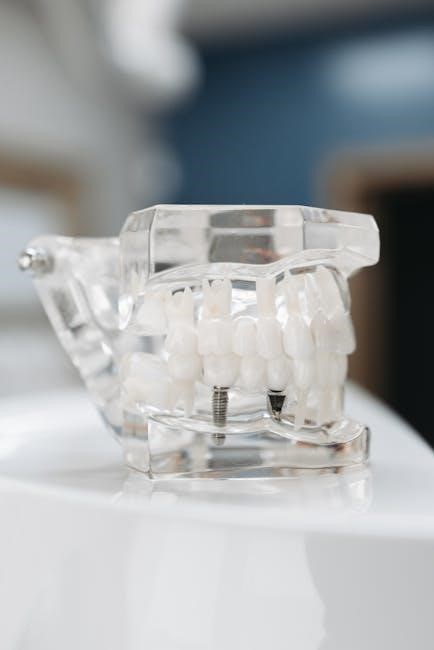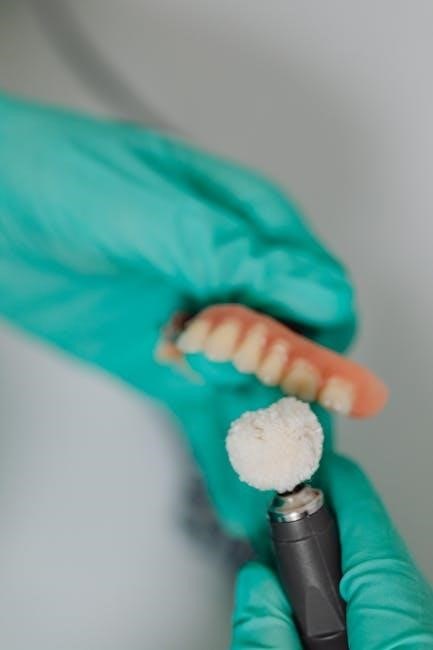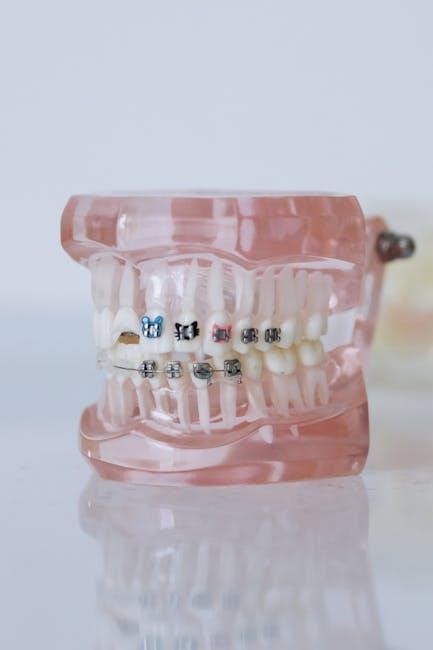Proper denture care is essential for maintaining oral hygiene, preventing infections, and ensuring comfort․ It involves a routine cleaning schedule and proper handling to extend denture life and support overall well-being․
Importance of Proper Denture Maintenance
Proper denture maintenance is crucial for preventing bad breath, keeping dentures clean, and maintaining a healthy mouth․ It prevents plaque and tartar buildup, which can cause infections and discomfort․ Regular care ensures dentures fit well, function properly, and last longer․ Neglecting maintenance can lead to oral health issues, discomfort, and costly repairs․ Consistent cleaning and soaking help maintain hygiene and comfort, ensuring dentures remain a reliable solution for restoring your smile and confidence․
Key Principles of Denture Hygiene
Proper denture hygiene involves consistent cleaning and maintenance to prevent plaque and tartar buildup․ Key principles include rinsing after meals, brushing with mild soap and a soft toothbrush, and soaking dentures overnight in a recommended solution․ Regular cleaning prevents bacterial and fungal growth, ensuring a fresh, comfortable fit․ Proper handling and storage also protect dentures from damage, maintaining their shape and functionality over time․

Daily Cleaning Routine
Rinse dentures after meals, brush with mild soap and a soft toothbrush, and soak overnight in a recommended solution to maintain hygiene and prevent damage․
Rinsing After Meals
Rinsing your dentures after every meal is crucial to remove food particles and debris․ Use cold water to dislodge loose fragments, ensuring a clean surface before reinsertion․ This simple step helps prevent bacterial buildup, stains, and unpleasant odors․ Consistent rinsing supports overall denture hygiene and maintains their appearance and functionality․ Regular rinsing is the first line of defense in a comprehensive denture care routine, promoting oral health and comfort․
Brushing with Soap and Water
Use a soft toothbrush and mild liquid soap to gently scrub all surfaces of your dentures, removing plaque and stains․ Avoid toothpaste, as it can be abrasive․ Brush over a basin of water or a towel to prevent breakage if dropped․ This method effectively cleans and maintains denture appearance, ensuring they remain hygienic and functional․ Regular brushing is a cornerstone of daily denture care, promoting oral health and comfort for wearers․
Using a Soft Toothbrush
A soft toothbrush is crucial for cleaning dentures, as it prevents scratching the acrylic surfaces․ Gently brush all areas, including the gum side, with mild soap and cold water․ This method effectively removes plaque and food particles without damaging the denture material․ Brushing over a basin or towel can catch any accidental drops, ensuring safety․ Regular use of a soft toothbrush helps maintain denture appearance and hygiene, promoting long-term functionality and comfort for the wearer․

Soaking Dentures Overnight
Soaking dentures overnight keeps them moist and maintains their shape․ Use water or a mild cleaning solution, following manufacturer guidelines to ensure proper hygiene and longevity․
Why Soaking is Essential
Soaking dentures overnight is crucial to maintain their shape and prevent warping․ It helps remove plaque and bacteria, ensuring hygiene․ Soaking also allows the mouth to rest, reducing the risk of fungal infections and irritation․ This step is vital for keeping dentures functional and comfortable over time․
Recommended Soaking Solutions
Use mild denture-soaking solutions or water to keep dentures moist․ Commercial products like denture tablets effectively remove plaque and stains․ Always follow the manufacturer’s instructions for concentration and duration․ Avoid harsh chemicals, as they can damage denture materials․ Soaking ensures dentures retain their shape and remain clean, promoting oral health and comfort․ Regular rinsing after soaking is essential before reinsertion․
Following Manufacturer Instructions
Always adhere to the manufacturer’s guidelines for cleaning products and soaking solutions․ Specific instructions ensure safety and effectiveness, preventing damage to denture materials․ Improper use of cleansers or soaking times can harm the dentures or reduce their longevity․ Pay attention to recommended dilution ratios and soaking durations․ Failure to follow instructions may lead to improper cleaning or potential damage․ Reading and understanding product labels is crucial for optimal denture care and maintenance․

Maintenance and Repairs
Regularly inspect dentures for wear or damage․ Handle them carefully to avoid breakage․ Never attempt DIY repairs; seek professional assistance for adjustments or fixes to ensure proper fit and function․
Regular Dental Check-Ups
Regular dental visits are crucial for maintaining denture fit and oral health․ Dentists can make necessary adjustments, clean hard-to-reach areas, and monitor for issues like fungal infections or gum irritation․ These check-ups help ensure comfort and prevent complications, keeping your dentures functioning optimally for years․
Handling Dentures Carefully
Always handle dentures with care to avoid damage․ Rinse them gently after meals and brush with mild soap and a soft toothbrush․ When cleaning, do so over a basin or towel to prevent breakage if dropped․ Avoid bending or forcing flexible parts, as this can cause permanent damage․ Proper handling ensures longevity and maintains the fit and functionality of your dentures․
Avoiding DIY Repairs
Never attempt to repair dentures yourself, as this can cause further damage or alter their fit․ Improper repairs may lead to discomfort, sore spots, or functional issues․ Always consult a dentist for professional adjustments or fixes to ensure the integrity and proper fit of your dentures․ DIY repairs often result in costly corrections and may compromise the effectiveness of your denture․

Oral Hygiene Practices
Oral hygiene practices are crucial for denture wearers․ Clean natural teeth and gums daily to prevent plaque buildup․ Use soft toothbrushes and denture-specific products for optimal care․
Cleaning Natural Teeth and Gums
Cleaning natural teeth and gums is vital for overall oral health, especially for denture wearers․ Use a soft toothbrush and mild liquid soap to gently remove plaque and food particles․ This helps prevent gum irritation and infection․ Regular cleaning ensures a healthy foundation for dentures to fit properly and function effectively․
- Brush natural teeth at least twice daily․
- Pay special attention to areas around the denture base․
- Use gentle strokes to avoid gum damage․
Preventing Plaque and Tartar Build-Up
Preventing plaque and tartar build-up is crucial for maintaining denture hygiene and overall oral health․ Regular rinsing and brushing with a soft toothbrush and mild soap help remove plaque․ Soaking dentures overnight in a recommended solution further aids in reducing bacteria and stains․ Consistent cleaning prevents tartar accumulation, ensuring dentures remain clean and functional while safeguarding natural teeth and gums from potential infections․
- Plaque buildup can lead to gum disease and bad breath․
- Tartar is harder to remove and requires professional cleaning․
- Daily maintenance is key to preventing these issues․
Using Denture-Specific Cleaning Products
Using denture-specific cleaning products is vital for effective maintenance․ Denture cleaning tablets or mild liquid soap are recommended for removing plaque and stains․ Avoid harsh chemicals or abrasive materials that can damage dentures․ Always follow the manufacturer’s instructions for proper use․ These products help maintain hygiene, prevent discoloration, and ensure a fresh, clean smile․
- Denture cleaning tablets dissolve plaque and stains effectively․
- Mild liquid soap is gentle yet effective for daily cleaning․
- Avoid using toothpaste, as it can scratch the denture surface․

Common Challenges with Dentures
Common challenges include initial discomfort, difficulty speaking, and eating․ Sore spots and fungal infections can occur if proper care is not followed․ Adjustments may be needed․
Adjusting to New Dentures
New dentures may feel bulky or unusual at first, requiring time to adapt․ The adjustment period varies, lasting weeks to months, depending on the type of denture and individual factors․ Initially, cutting food into small portions and chewing with both sides can help prevent tipping․ It’s important to follow care instructions and avoid forcing the denture during insertion or removal․ Regular follow-ups with your dentist ensure proper fit and address any discomfort promptly․
Preventing Sore Spots
To prevent sore spots, ensure proper denture fit and avoid forcing the denture during insertion or removal․ Handle dentures carefully to prevent bending or breaking flexible parts․ Regular dental check-ups can address minor adjustments early, reducing discomfort․ Eating soft foods initially and avoiding biting or clenching on the denture can also help; Monitor fit and comfort, addressing any issues promptly to prevent prolonged irritation or inflammation․
Managing Fungal Infections
Regular cleaning and proper denture care are crucial to prevent fungal infections․ Always rinse dentures thoroughly after meals and clean them with mild soap and water․ Soaking overnight in a recommended solution helps eliminate bacteria and fungi․ Ensure dentures are dry before reinsertion, as moisture can foster fungal growth․ Avoid sleeping with dentures unless advised by your dentist, and consult them promptly if signs of infection appear․

Denture Care Products
Denture care products include cleaning tablets, mild liquid soap, and denture adhesives․ These tools help maintain hygiene, prevent stains, and ensure a secure fit for optimal comfort․
Denture Cleaning Tablets
Denture cleaning tablets are effective for removing plaque and stains․ They work by creating a fizzing action when dissolved in water, breaking down tough residue․ For best results, soak dentures overnight according to product instructions․ Regular use helps maintain freshness and prevents bacterial buildup, ensuring dentures remain clean and hygienic․ Always choose tablets designed for your denture type to avoid damage or discoloration․
Mild Liquid Soap for Cleaning
Mild liquid soap is a gentle and effective cleaning agent for dentures․ Use a soft toothbrush to apply the soap, brushing all surfaces gently to remove plaque and debris․ Avoid harsh chemicals or abrasive cleaners, as they may damage the denture material․ Rinse thoroughly with cold water to ensure no residue remains․ This method is ideal for daily cleaning and maintains the denture’s appearance without causing wear or tear․
Denture Adhesives
Denture adhesives, available as pastes, powders, or strips, enhance stability and comfort for denture wearers․ They create a secure bond between the denture and gum, reducing movement during eating or speaking․ Follow product instructions carefully, as excessive use can lead to buildup․ Adhesives are not a substitute for proper fit or regular cleaning․ Use them sparingly to avoid interference with denture hygiene and maintenance․

Storage and Handling
Store dentures in water or a cleaning solution to maintain shape and moisture․ Use a cleaning box for protection and handle carefully to avoid damage or breakage․
Storing Dentures in Water
Storing dentures in water overnight helps maintain their shape and keeps them moist․ Use cold water to prevent warping and rinse thoroughly before reinserting․ This practice prevents drying out and ensures comfort․ Avoid hot water, as it may cause distortion․ Always rinse dentures before soaking to remove loose debris․ This step is crucial for maintaining hygiene and preventing bacterial growth․ Regular water storage supports long-term denture durability and fit․
Using a Cleaning Box
A cleaning box is an ideal storage solution for dentures, protecting them from damage and keeping them clean․ It provides a safe space for soaking and rinsing, ensuring hygiene․ Place dentures in the box with a cleaning solution or water, following manufacturer instructions․ This prevents scratches and bacterial growth, maintaining denture quality․ Regular use of a cleaning box promotes proper care and extends the life of your dentures, ensuring they remain in optimal condition․
Proper Insertion and Removal Techniques
To ensure proper fit and avoid damage, insert dentures gently using both hands․ Follow the natural curve of your mouth, starting with the back and guiding forward․ For removal, use a rocking motion with your fingers, carefully lifting front and back․ Never force or bite down to remove, as this can cause breakage․ Always handle dentures over a basin of water to prevent accidental drops and damage․ This ensures safety and longevity of your dentures․
Adjusting to Dentures
New dentures may feel bulky or uncomfortable initially, but most people adapt within a few weeks to months․ The adjustment period varies based on the type of denture and individual oral conditions․
Initial Sensations and Discomfort
When first wearing dentures, they may feel bulky or unfamiliar, causing discomfort․ This is normal, as the mouth adjusts to the new appliance․ Initial sensations include unevenness, sore spots, or difficulty speaking․ The adjustment period typically lasts a few weeks, during which discomfort gradually subsides․ Eating soft foods and avoiding hard or sticky items can help ease the transition․ Proper insertion techniques and regular follow-ups with your dentist are crucial for a smooth adaptation․
Eating and Speaking with Dentures
Eating with dentures requires a gradual adaptation period․ Start with soft foods and cut them into small portions to avoid discomfort or denture movement․ Chew using both sides of your mouth to distribute pressure evenly․ Avoid biting or tearing food with the front teeth, as this can cause instability․ Speaking may feel awkward initially, but practicing pronunciation and enunciating clearly will improve confidence․ Over time, these actions will become more natural and comfortable․
Gradual Adaptation Period
Adapting to dentures takes time, with the initial weeks feeling bulky and awkward․ The mouth gradually adjusts, improving comfort and functionality․ Start with soft foods and gradually introduce more solid items․ Practice speaking to refine pronunciation․ Consistent cleaning and regular dental visits ensure proper fit and comfort during this transition, helping you regain confidence in eating, speaking, and overall oral health․

Follow-Up Care
Scheduling regular dental visits ensures proper fit and comfort․ Monitor your dentures’ condition and address any issues promptly to maintain optimal oral health and functionality over time․
Scheduling Regular Dental Visits
Regular dental visits are crucial for ensuring your dentures fit properly and function well․ Schedule check-ups every 6 months to address any adjustments or repairs․ Your dentist will inspect the dentures for wear and tear, assess oral health, and ensure no issues like gum irritation or misalignment․ These visits help prevent complications, maintain comfort, and extend the lifespan of your dentures, ensuring they continue to support your oral well-being effectively․
Monitoring Fit and Comfort
Regularly check how your dentures fit and feel․ If they become loose, cause sore spots, or feel uncomfortable, consult your dentist promptly․ Proper fit is essential for chewing, speaking, and overall satisfaction․ Over time, changes in your mouth can affect how dentures fit, so monitoring is key to maintaining comfort and functionality․ Addressing fit issues early prevents more severe problems and ensures your dentures remain comfortable and effective․
Addressing Any Issues Promptly
If you notice cracks, chips, or discomfort, contact your dentist immediately․ Ignoring issues can lead to further damage or complications․ Prompt attention ensures your dentures function properly and remain comfortable․ Regular check-ups and addressing concerns early help maintain optimal oral health and extend the life of your dentures․ Early intervention prevents minor problems from becoming major issues, ensuring your dentures continue to serve you well․
Proper denture care ensures longevity, comfort, and oral health․ Regular cleaning, soaking, and check-ups prevent issues and maintain functionality․ Follow guidelines for a healthy, confident smile․
Rinse dentures after meals, brush with soft toothbrush and mild soap, soak overnight in water or solution, handle carefully, and store properly․ Regular dental check-ups and avoiding DIY repairs ensure optimal fit and hygiene․ Clean natural teeth and gums, use denture-specific products, and follow manufacturer instructions for soaking solutions․ Proper care prevents plaque, stains, and infections, maintaining comfort and functionality for years․
Long-Term Benefits of Proper Denture Care
Proper denture care extends their durability, prevents stains, and maintains their fit․ It reduces the risk of infections and bad breath, promoting oral health․ Regular cleaning and maintenance prevent plaque buildup, ensuring dentures remain functional and comfortable․ Proper care also safeguards natural teeth and gums, contributing to overall well-being and confidence in appearance and speech․ Consistent care routines help avoid costly repairs and ensure long-term satisfaction with dentures․

Frequently Asked Questions
How Often Should Dentures Be Cleaned? Clean dentures after every meal and at night to prevent plaque buildup․ Use mild soap and a soft toothbrush for effective cleaning․
Can I Sleep with My Dentures In? Generally, no․ Remove dentures at night to allow your mouth to rest, unless advised otherwise by your dentist․
What If My Dentures Break? Contact your dentist immediately․ Avoid DIY repairs, as improper fixes can damage the dentures further․
How Often Should Dentures Be Cleaned?
Dentures should be cleaned after every meal and before bed to remove food particles and plaque․ Rinse with water after meals, brush with mild soap and a soft toothbrush daily, and soak overnight in a recommended solution․ Regular cleaning prevents plaque buildup, bad breath, and infections, ensuring a healthy mouth and long-lasting dentures․
Can I Sleep with My Dentures In?
It is generally advised not to sleep with dentures in your mouth unless directed by your dentist․ Removing dentures at night allows your gums to rest, reducing the risk of fungal infections․ Soaking them overnight in water or a cleaning solution helps maintain their shape and hygiene․ This practice promotes oral health and prevents potential complications․
What If My Dentures Break?
If your dentures break, avoid attempting DIY repairs, as this can cause further damage․ Contact your dentist immediately for professional assessment and repair․ Do not continue using broken dentures, as this may lead to additional issues․ Temporary solutions, like dental adhesives, may be suggested, but only as a short-term fix․ Proper repair ensures a secure fit and prevents oral discomfort or infections․
